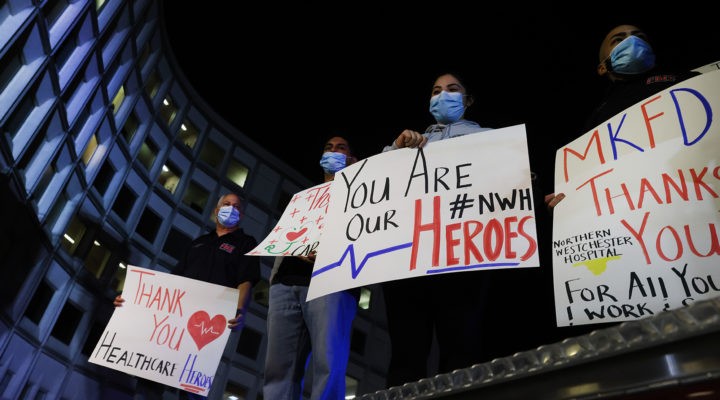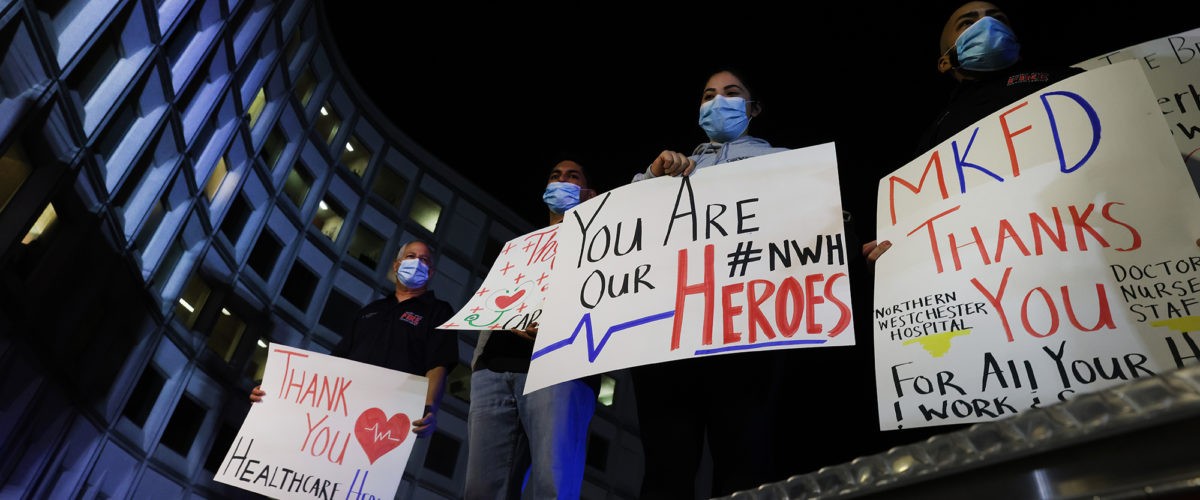Sarah Griffith Lund experienced so much anguish over the loss of loved ones in 2020 that she felt called to contribute to the recently released book, Prayers and Blessings for Healthcare Workers.
“I realized I was holding such intense grief and pain over the past year … that the prayers and blessings really came from a raw place inside,” said Lund, senior pastor at First Congregational United Church of Christ in Indianapolis and an author and expert on mental health.

Sarah Griffith Lund
Lund contributed four of the books more than 70 prayers and blessings tailored to meet the spiritual and emotional needs of health care professionals amid the coronavirus outbreak that has generated 45 million cases and nearly 730,000 deaths in the U.S. alone.
The ecumenical and interfaith prayer submissions, edited by Mandy Mizelle, also explore the frustration, grief, exhaustion and despair health care professionals are experiencing — as they work endless shifts in crowded hospitals where patients died isolated from loved ones.
Contributor Gayle Fisher-Stewart focused on the anger resulting from being in dangerous environments without public understanding or appreciation.
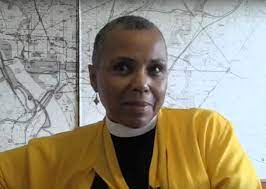
Gayle Fisher-Stewart
“Scream, cry. God can handle it. These are unusual times. Death is a constant companion,” wrote Fisher-Stewart, associate rector at Calvary Episcopal Church in Washington, D.C. Her submission is titled, “It is OK to Scream.”
Reflecting on the prayer shortly after the book’s August 2021 release, Fisher-Stewart said it remained even more appropriate during the spike of the Delta variant when unvaccinated patients flooded hospitals even as anti-vax conspiracy theories abounded.
“They are in this situation of ‘I may not agree or like you, but I have to care for you. So let me just go outside and have a good old scream and a cry as opposed to holding it in and being pious.’”
The scream approach was informed by 20 years as a Washington, D.C., police officer, when Fisher-Stewart said she had to learn to keep her opinions and emotions to herself in difficult, often traumatic situations.
“Sometimes we aren’t given permission to act on our emotions. This prayer was permission do whatever you need to do to take care of yourself,” she said. “Sometimes we just need that ugly cry to get out everything that’s in us — the hurt, disappointment, confusion.”
That confusion often was expressed through bewilderment over the perceived absence of God amid the darkness and death of the pandemic, said Malcom Marler, senior director of pastoral care at University of Alabama at Birmingham Medicine, where he has served as a chaplain since 1994.
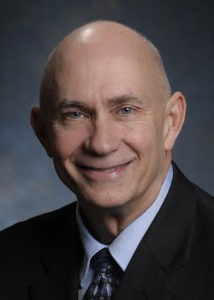
Malcom Marler
“When we go through a crisis, whatever that crisis is, sometimes we wonder where God is. We’re like, ‘Where are you? I don’t feel your presence. I don’t know that you’re with me,’” said Marler, who wrote “God is Everywhere” in Prayers and Blessings.
His prayer answers the question with spatial designations — above, behind, below, beside, in front and within — to remind despairing hospital employees where they can find an abiding comfort amid suffering. Marler said the exercise has guided him through the pandemic as a chaplain.
“That kind of ‘where are you?’ feeling, or isolated or alone feeling, is part of why I originally wrote it, because there were times when I felt that way,” he said. “It’s a reminder that there is not anywhere we go or anywhere we are that God is not with us. It’s just a tangible, directional approach that covers the whole part of our life experience.”
Marler added that health care workers continue to need special prayers and blessings even as the Delta variant wanes. “What’s going on now for them is that some people have lost their callings, or lost touch with their callings. I’ve heard nurses tell me all through the years this is what they were called to do. But this has been such a conflicting time that they are no longer sure.”
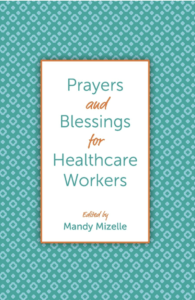 Based on the experiences of family and church members who work in health care, Lund said the tension continues for hospital staff even as the virus presently wanes. “There is still a high level of stress, and people are exhausted.”
Based on the experiences of family and church members who work in health care, Lund said the tension continues for hospital staff even as the virus presently wanes. “There is still a high level of stress, and people are exhausted.”
Lund recommended that health care workers — and anyone experiencing chaos — try writing their prayers just as she and other contributors did for Prayers and Blessings.
“It is therapeutic and healing. To tell the true stories is part of the healing process, and sometimes we tell those stories in the form of prayer and lament and petitions and blessings.”
And it’s even possible some of those prayers eventually will turn to thanks as the coronavirus infections continue to recede, Lund said. “We can celebrate all that we have survived and that we are still here and we didn’t give up. And for that, we can say, ‘Thank you.’”
BNG Executive Director Mark Wingfield also is among the volume’s contributors.
Related articles:
Through 14 months of pandemic, hospital chaplains have carried others’ burdens
Faith community nurses ‘carry the hope’ during COVID-19 pandemic
Getting my vaccine was a humbling, sacred moment | Opinion by Laura Rector

